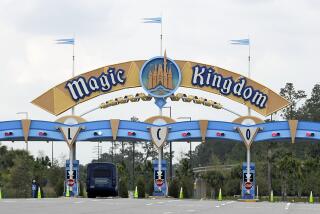Korean War Workers Sue 2 Japanese Firms
Nearly 60 years after they were forcibly taken to Japan to work, they say, as slave laborers, eight elderly Korean men in the United States and South Korea have teamed up to file lawsuits in Los Angeles against two giant Japanese companies, Mitsubishi and Mitsui.
In their Superior Court complaints Tuesday, the plaintiffs charged that they were abducted from their homes and taken to Japan to do slave labor for the two conglomerates during World War II.
Attorneys for the men are asking the court to certify the cases as class action, which would enable others to join the litigation. They are seeking reparations for lost wages, compensation for pain and suffering and punitive damages.
The plaintiffs’ lawyers brought the suits under a 1999 California law that permits former conscripted workers to lodge claims against Japanese companies with subsidiaries in the United States.
Representatives of Mitsubishi and Mitsui in California and New York were not immediately available for comment Tuesday.
With President Theodore Roosevelt’s blessing, Japan gained control of Korea in 1905, then annexed it five years later. For the next 35 years, it ruled the Korean peninsula with a brutal hand.
Hundreds of thousands of young Korean men were conscripted to work in mines and munitions factories in Japan and Manchuria and on the Sakhalin Islands to help build Japan’s war machine.
Japan’s agents also forced an estimated 100,000 young Korean women--called “comfort women”--to work as sex slaves for Japanese soldiers. Some of those women have taken their cases to courts in the United States and Asia, where they are pending.
“I still grind my teeth when I look back at those years,” said Oh-Hun Kwon, 81, one of the eight named plaintiffs. Kwon, now a Los Angeles resident, said he was abducted from his home in Seoul in March 1944, and spent the war years working for Mitsubishi Shipbuilding in Yokohama, Japan, alongside American and British prisoners of war.
The Koreans say they worked 12 hours a day without pay and slept on wood floors in unheated barracks. After Japan’s defeat, they returned to Korea.
“I hope I can see Japan brought to justice before I die,” said Syeong-Kyoon Ahn, 78, a Koreatown resident and another named plaintiff.
His work at Mitsui Shipping in Okayama was so grueling that he developed a hernia, he said. In May 1945, he received seven telegrams from his family, telling him that his mother was gravely ill.
“Even then, my supervisors would not give me a week off to go home to see my mother,” he said.
Numerous efforts by victims to hold the Japanese government accountable have been mostly unsuccessful.
In addition to having the benefit of the 1999 California law, the plaintiffs are optimistic because they have a strong legal team representing them.
Members include lawyers who successfully represented Holocaust survivors against businesses across Europe.
“World War II began for Americans in 1942, but for the Koreans, the atrocities [go] back to 1929,” said Century City attorney Barry A. Fisher, a lead lawyer in both cases. The suit covers Koreans who worked for Japan from 1929 to 1945.
Fisher said this case was the first joint legal action by conscripted workers in both Korea and the United States.
The timing of the suit’s filing coincides with the anniversary of a significant event in Korean history, Fisher said. On March 1, 1919, Koreans rose up in massive demonstrations against Japanese rule. More than 7,600 unarmed Koreans were killed and 45,562 civilians were injured in the protests.
More to Read
Inside the business of entertainment
The Wide Shot brings you news, analysis and insights on everything from streaming wars to production — and what it all means for the future.
You may occasionally receive promotional content from the Los Angeles Times.










